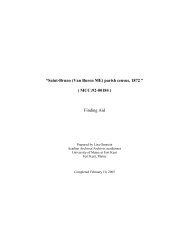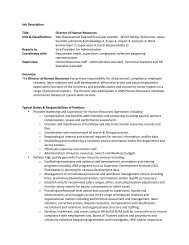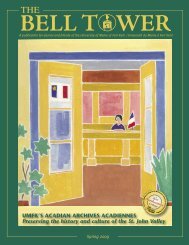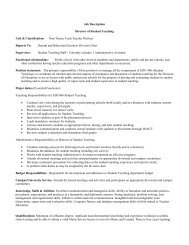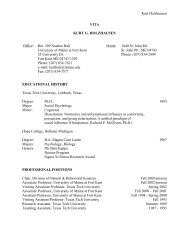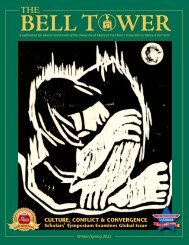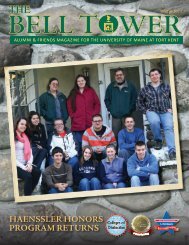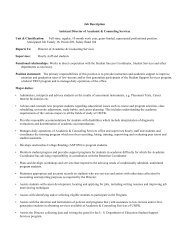summer 2012
summer 2012
summer 2012
- No tags were found...
You also want an ePaper? Increase the reach of your titles
YUMPU automatically turns print PDFs into web optimized ePapers that Google loves.
A PERSPECTIVE FROM VASSAR COLLEGEBY CAMILA DELGADO-MONTESVassar’s Butterbeer Broooers are wellknown, to quote Tumblr’s The GoldenSnitchy, as “one of the nicest and mostbizarre teams.” Since its founding, we’vebeen firm proponents of hijinks (likeseekers wearing pink tutus, cartwheelswhen we feel a game merits them), a generaldesire to try and be lovely people, andfinally, a passion for sportsmanship and aclean game.So it has always perplexed and angeredme that other teams have underestimatedus because of our spirit. I was a captainwhen my team won fourth place inWorld Cup IV a mere year ago, so ourtalent should not be an issue. So why isour skill questioned because we knowhow to have fun? And why do peoplefeel that “having fun” and “competition”are mutually exclusive? Vassar, at least, isa competitive team who plays for fun—indeed, there is no point in playing unlessyou are enjoying it. But lately, I have noticedmatches debased by the urge to win,which, like Andy Hyatt mentioned, arelike “competing in a fight to the death,”and matches and tournaments where ridiculousviolence and rule breaking havebeen prevalent. Snitchy even said that“being extremely rule-abiding makes[Vassar] noble but not always practical,”and I had to pause for a second. Followingthe rules is not being noble; it makesyou a decent person, and hardly deservingof the description “noble.” What isthe point of playing a game if you aren’tplaying cleanly and well? At that point,you aren’t winning because of your skillor dedication, but because you don’t respectthe game, the rules, the teams, oreven yourself to be able to win based actualwork…instead, you end up relyingon cheating and violence. “Winning atall costs” already warps people…but doesit have to encroach on our beloved nichesport?I understand that quidditch is an aggressivesport, and that is part of why Ilove it so much! I enjoy tackling and beingable to take a tackle. I enjoy baringmy teeth, dodging and weaving, and howutterly physical our game is in a way thatI never got out of basketball in school.But the moment we treat it like we treatother sports, we destroy what truly makesquidditch special. I decided not to playbasketball so I could join quidditch, notjust because I am a Harry Potter fan, butalso because it is a special sport that was aperfect meeting place for the athlete andbeginner, and because the family I foundin it has become one of the most importantparts of my college career. If I hadever wanted quidditch to be like othersports, I would have stuck to basketball,gosh-darnit, and avoided the hecklingfrom friends, family, and strangers alike.So why do people try to make quidditchlike other sports? Do they feel insecurewith the “quove” aspect? Why dowe need to change ourselves to resemblethe others, to become less unique, whenthese other sports already exist and havefilled this niche to excess? Why takeaway the magic, the silliness, when it isexactly that which first made quidditch,and its prankster snitch, the great thing itis? Standardizing our beloved game, oursport, is like taking out the wings fromthe snitch, because bludgers and quafflesdo not have them. Whimsy is what set usapart. Without whimsy, quidditch wouldbecome frightfully dull; it would cheapenus, and bring us down to the averagesport.I personally am not insecure enough tohave to justify quidditch to our constantdoubters, or to change my playing styleor the spirit of the game to “prove” myselfto these haters: it is their loss if they cannotenjoy quidditch, and it is other teams’loss, more than mine, if they think that“competition” cannot go hand in handwith “whimsy.”In this sense, the ICBA does notmake sense to me, but I understand thatthey have a very different set of prioritiesthan I do. However, while readingthe arguments surrounding their split, Ifound that a lot of the complaints wereregarding issues that the still-young IQAhas already started working on, and thatwill thus be addressed in the near future.As such, I think that the split is far moreone regarding the spirit of our game, thanone of its administration, a split that liesprecisely at this apparent discriminationagainst whimsy. I want the ICBAto prove me wrong, so I will be followingtheir progress with cautious optimism.My hope is that if quidditch stabilizes,hopefully with the whimsy intact, andwith the general ref and season concernsof the ICBA addressed by the IQA, theywill reincorporate themselves into thegeneral IQA and quidditch world.I will stand by and congratulate theICBA for taking charge for their opinionsand desires, so long as it comes withthe understanding that my “whimsy”does not make me a poorer player, or myteam less talented or competitive. n“The problem to theaverage sports fan,and to the perceptionof our game, is not thewhimsy. It’s that wejustify the whimsy bydiscrediting quidditchas something lessthan it is.”body to get hurt. Disrespectful fights onlystifle the game’s growth. One of most gloriousparts of the game is that it can meananything to anyone. Hyatt and Armentorcould play on the same team, and both getwhat they want out of it. Before we worryabout whether we will play in a more competitiveor whimsical league, we should createan environment where any player or fancan be as competitive or whimsical of anindividual as they want.The problem to the average sports fan,and to the perception of our game, is notthe whimsy. It’s that we justify the whimsyby discrediting quidditch as somethingless than it is. Just because we’re runningaround on broomsticks doesn’t mean quidditchcan’t be one of the most meaningfulparts of our lives. In Armentor’s words,“Yes, we play with brooms. But we still playa sport. Competition is part of sport.” Andin Marks’s: “I don’t want to lose how competitivethis sport is, because every game wewon gave me a sense of such pride that Ican’t even describe. But I also don’t want tolose the camaraderie I have with even mybiggest rival.” There is an incredible synergycreated by the high stakes competition, ourcreativity to break the conventions of usualsport, and our creativity to make quidditchsomething so much more than it was inHarry Potter. Sorry, Jo Rowling, you madesomething seriously awesome—but wemade it way better. nDan Hanson went to Emerson College inBoston, where he played keeper for two years.After graduating, he manifested his destinyby moving to Los Angeles, where he watchesTV and co-founded the future quidditchpowerhouse team, the Lost Boys.40 Quidditch Quarterly • Summer <strong>2012</strong>RIGHT: A TEXAS A&M KEEPER TACKLES VASSAR’S KEEPER AT WORLD CUP V. (PHOTO: QUIDDITCHPHOTOS.COM)



